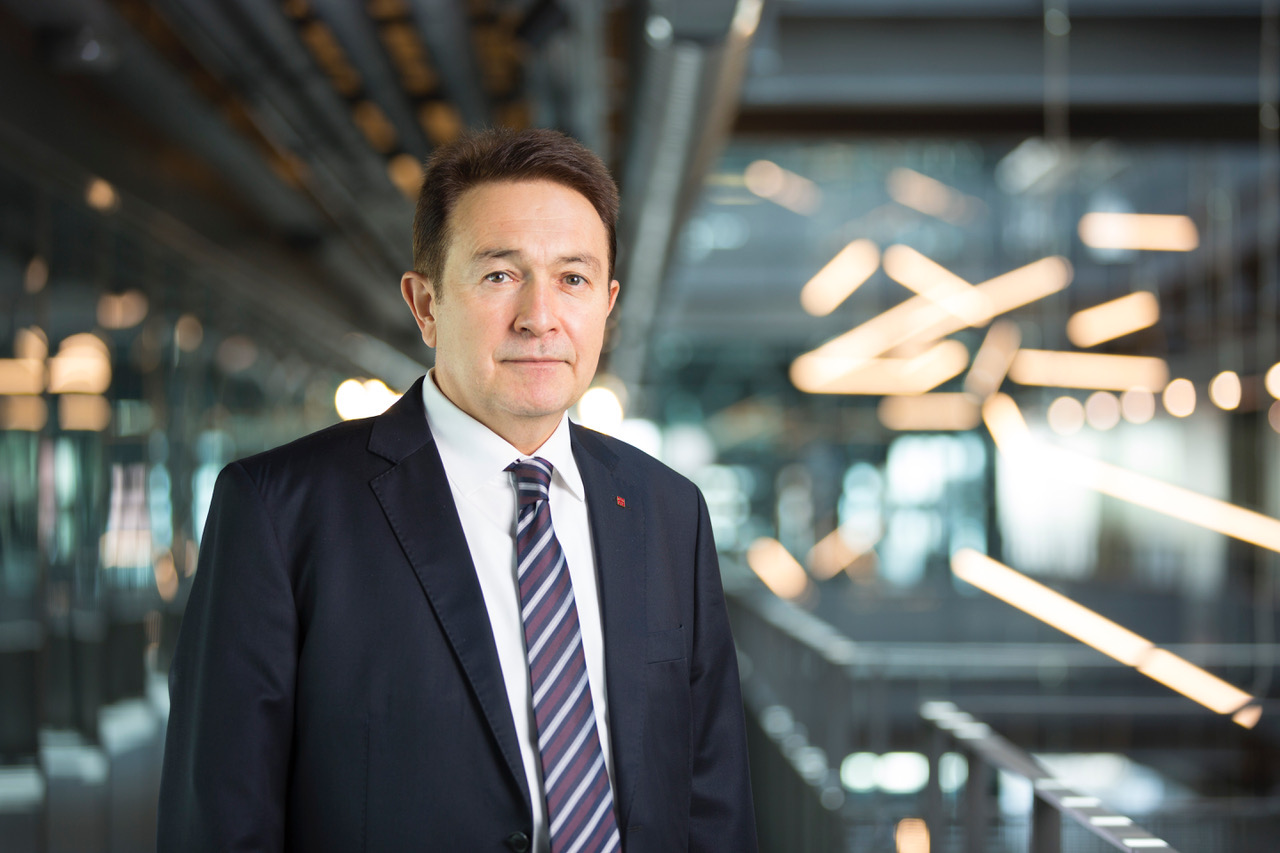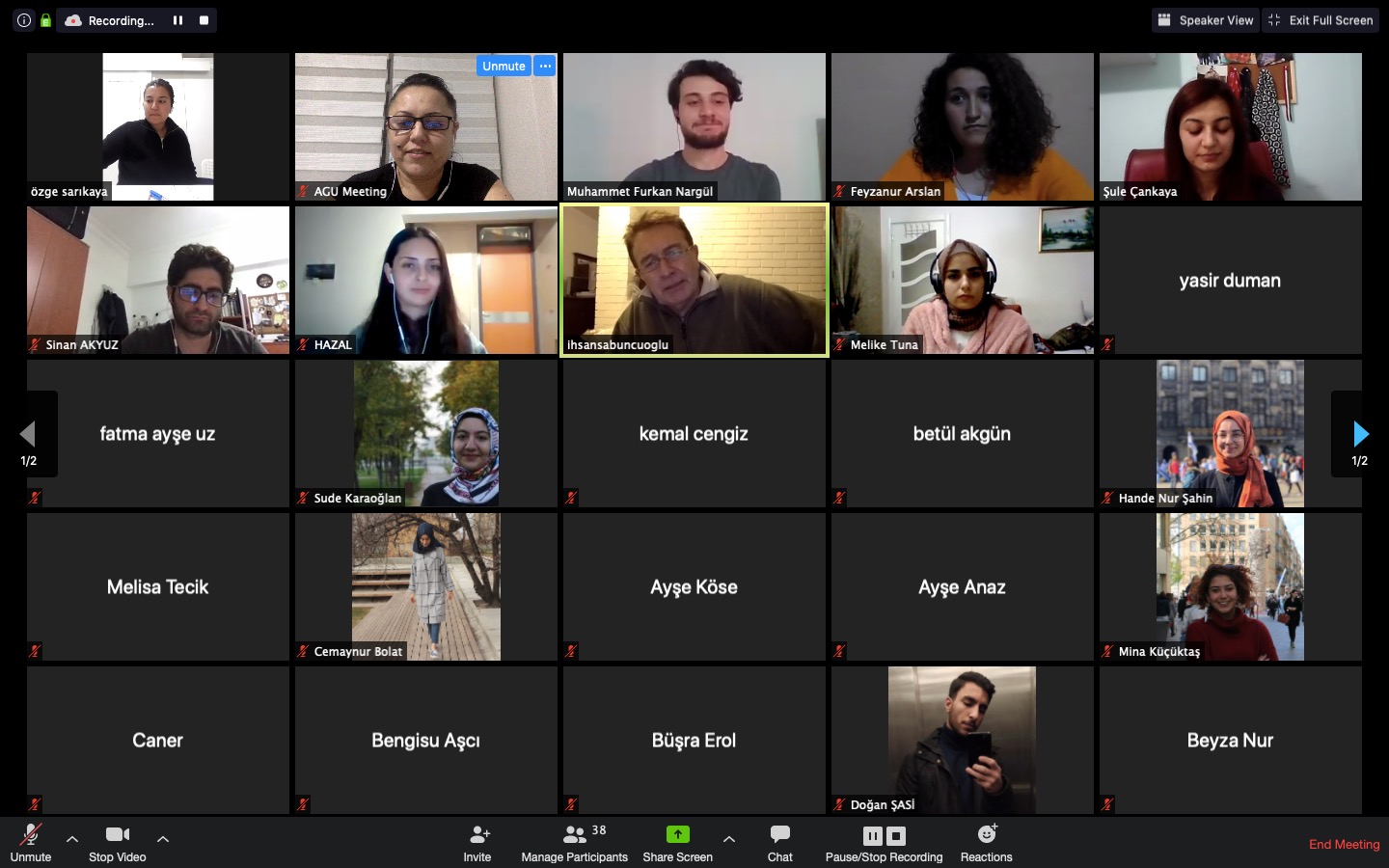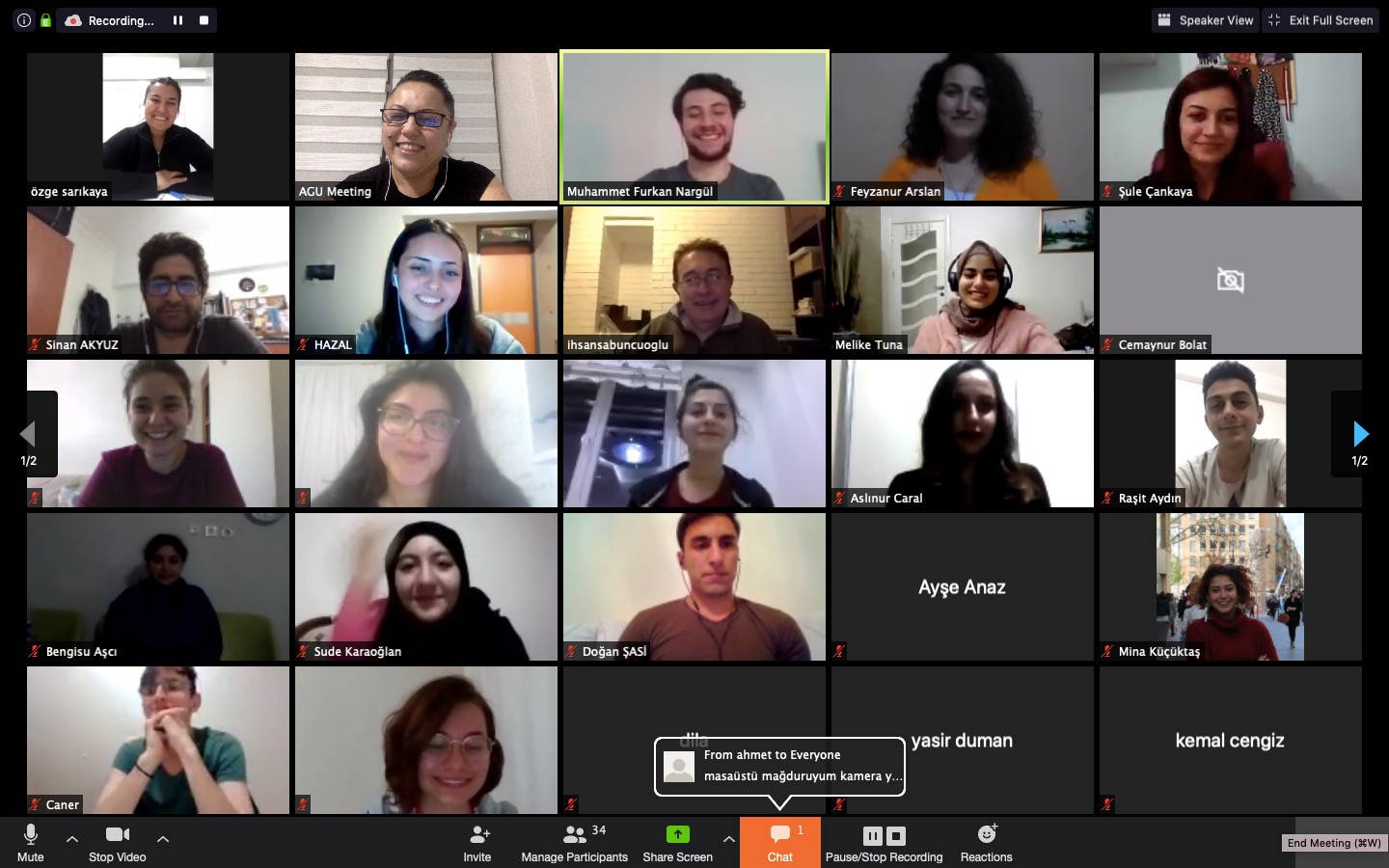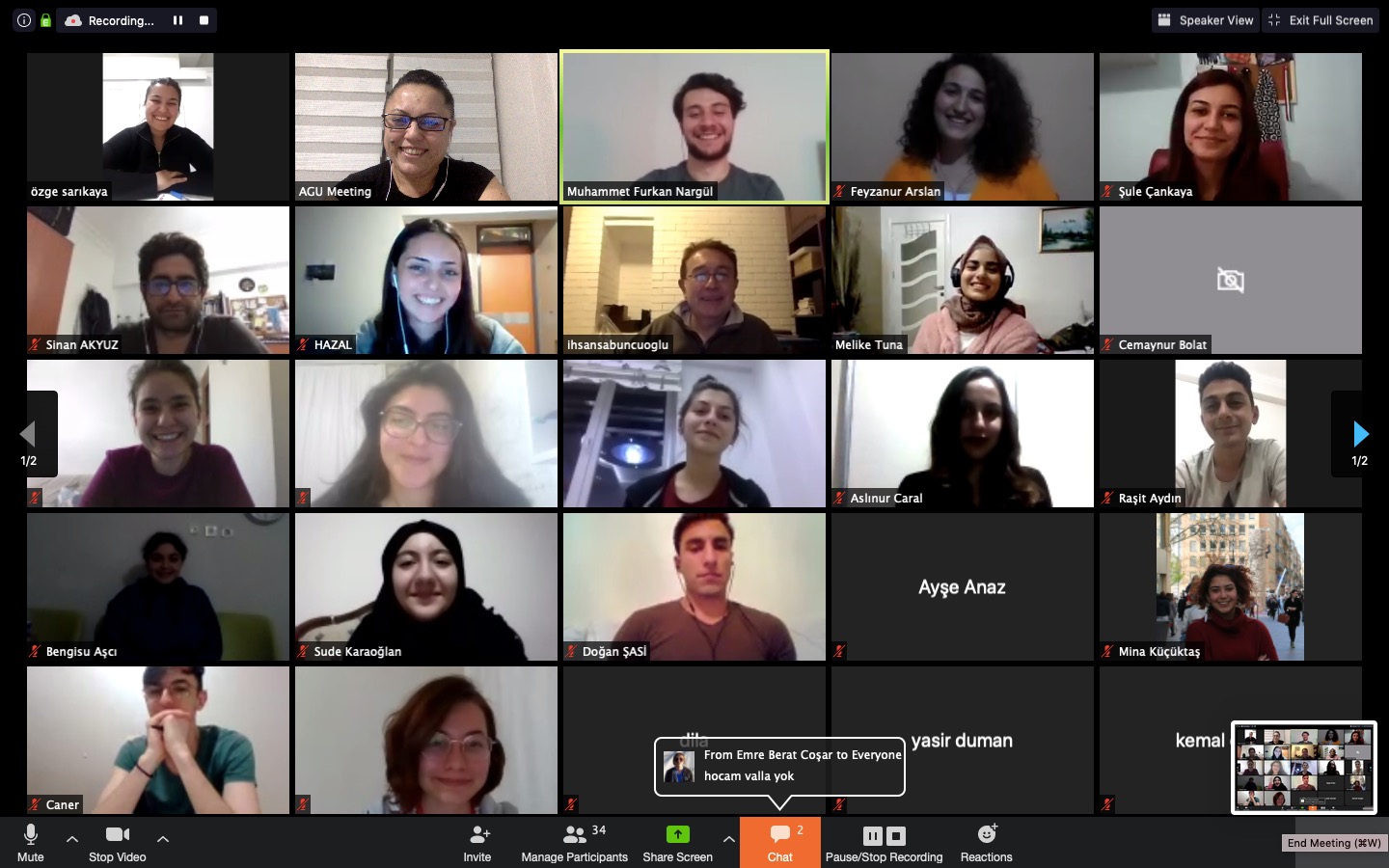Distance Education at AGU
Abdullah Gül University (AGU) Rector Prof. İhsan Sabuncuoğlu stated that in the face of the pandemic, even the superpowers of the world have been helpless, there are important lessons to be learned from these times, we have seen a milestone in the education sector as it needs to review its traditional methods and approaches being used for centuries and introduce large-scale reforms. Prof. Sabuncuoğlu said, "Educational institutions will have to use synchronous or asynchronous learning tools in distance education to continue their activities." The Rector expressed that in the upcoming periods, digital developments will gain momentum removing space and time restrictions on educational institutions, and education will depart from the traditional teacher-oriented structure and adopt a learner-oriented one.
Prof. Sabuncuoğlu stressed that Covid-19 pandemic is not the first in the human history, and it shall not be the last as similar global outbreaks and crises are likely in the near future. He reminded that such crises are not very surprising considering the fact that the United Nation foresaw these days and put 17 global goals and mechanism before every country in 2015 in order to find solutions to global problems together.
The ongoing pandemic will also seriously affect us economically and socially, and some important lessons must be taken from this phenomenon, said Prof. Sabuncuoğlu. He added: "This is also a milestone for the education sector. It needs to review its traditional methods and approaches being used for centuries and introduce large-scale reforms. Distance education is a reality now, and all educational institutions, first and foremost universities, will have to use synchronous or asynchronous learning tools in distance education to continue their activities." In this context, work on virtual and augmented realities must gather pace, stated Prof. Sabuncuoğlu. He emphasized that it will no longer be possible to get back to the comfort zone of the traditional education from the online education, and all institutions must adapt to this situation.
Abdullah Gül University is not foreign to these new concepts, because it valued online education as part of the third generation university mission since its establishment, said Prof. Sabuncuoğlu. They have developed many mechanisms ba
Prof. Sabuncuoğlu shared the following information:
1- How do AGU faculty and students participate in distance education?
We use an open-source e-learning software called CANVAS Learning Management Platform. We are actively using the CANVAS, which has an easy-to-use interface, on computers via web browsers or mobile devices.
For synchronous conferencing in which the faculty members and students interact, we are using ZOOM, a video conferencing platform. Wherever students are, they are able to communicate with the faculty and course assistants online, as if they were in the same environment.
In addition to CANVAS and Zoom, there are classroom evaluations using interactive tools available virtually so that students can continue their projects and teamwork.
2- Are students able to interact with the faculty in that setup?
Absolutely. In both the asynchronous (Canvas Learning Management System) and synchronous (Zoom Online Video Conferencing System) platforms, the students and faculty are able to interact with each other.
In place of face-to-face meetings, discussions forums in Canvas and other interactive tools will be used. In the discussion forums, the students can talk about a topic while their instructors join at intervals and make their presence known. A concept has emerged called Humanizing Online Teaching. This is really important for us, and we dwell on this issue.
3- What preparations have you done to realize online education at AGU?
For the last couple of months, the USA and Europe have been talking about these issues, and we have been following closely. We have put together a Task Force looking answers to questions such as which platforms are being used, what interactive tools are available for teaching and evaluation, what our undergraduate and graduate students need respectively. We initially sent our students an information pack for reference. For the last week, we have been briefing our permanent faculty and research assistants via Canvas and e-mails. The faculty can also share good practices they implement online with each other via CANVAS and answer each other's questions.
We are also aware that our preparations cannot stop, because these are not ordinary times. Some students might have problems with internet connection at their current locations. We are trying to develop solutions for such unexpected issues.
4- Will there be a quality difference between the traditional and distance education?
The main difference is this: The former consists of bringing together the faculty and students face-to-face on specified days on the campus, while in the latter certain resources are shared with the students by the faculty. Already, this forms the basis of flipped classroom or learning concept. Firstly, the students access course materials beforehand and start learning by themselves to a point, then they meet in synchronous learning which is in a way face-to-face and ask whatever they could not grasp to the instructors for explanation. In fact, this has been planned to be a very effective and high-quality education.
5- How have you prepared course contents for the distance education?
Firstly, the faculty were informed that they needed to revise their current course contents, revisit their course evaluation approaches, and manage the process in a weekly schedule and flow enabling students learn remotely. Within a few days, instructors, chairs and deans will finalize together the course contents and syllabi to share with the students. The information sharing both among the faculty and with students also takes place in synchronous video conferences and by means of written notices. Moreover, the faculty will meet online to answer students' questions and resolve uncertainties in their heads.
6- If the students miss online classes, can they reach the course contents afterwards?
Online classes are being recorded, and these recordings are shared with the students in parts, which allows them download easily and watch later. Certainly, the students have the chance of catching up with the missed classes.
7- How will exams be administered in the distance education?
There will be different methods of examination during the distance education. In one of the methods, questions will be specific for each student. In that scenario, they will self-administer an exam and answer the questions. In place of some exams, projects, homework, or reports will be prepared. After the pandemic is over, and everyone come together again, final exams will take place.
8- Will the students have a make-up exam option in that system?
If the students can take the final exams in the summer, makeup exams might be administered in September to prevent any disadvantages incurred by this extraordinary period.
9- What advantages will the distance education have for AGU?
We, as AGU, attach great importance to the new educational approach in which an instructor acts more like a facilitator for learning, a guide in the learning process. We adopt the approach in which students are in the center and active rather than the visa versa, and instructors facilitate the learning process. To this end, we have put into action several approaches and applications. Also in the future, we will use the experience gained in this period and largely continue with this approach in courses allowing students to study by themselves with pre-recorded videos, audio recordings, online course contents, to formulate their questions and send instructors in advance. We would like to create an environment where students clarify what they do not understand, lead discussions, slove problems, carry out group work, and largely learn from each other when they meet face to face in courses, and where instructors share their experience in this process rather than presenting course contents in slides or books on boards or screens. We are going to even develop the online materials created in this process, produce more quality ones, and put them into the center of our education system.
10- How do you contribute to the social, cultural, and intellectual development of the students besides their academic improvement during the distance education?
We care about not only the academic improvement of our students, but also their social, cultural, and intellectual development.
For that reason, we have initiated an Online Support Program. In this program, students come together online every evening for experience and knowledge sharing.
The online platform enables students in particular to share their experiences and sometimes interact with invited speakers, thus helps with their self-development in social, cultural, and intellectual areas.
Our students will also continue their meetings with mentors from the Chambers of Industry and Commerce online within the scope of the Career Consultancy program. The Career and Employability Office will organize webinars with guest speakers for student development.
The Gaming Club will host various online gaming events. We are also planning yoga and meditation activities, as well.
We are encouraging our students to follow us on the institution's social media accounts for upcoming national or international online events.
Our International Office and other divisions working with the students will plan their events and announce them weekly.
Thanks to all these plans, the students will be active in this period and not drift away from the university.




